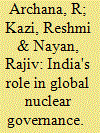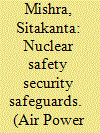| Srl | Item |
| 1 |
ID:
131602


|
|
|
|
|
| Publication |
2014.
|
| Summary/Abstract |
This article explores whether the IAEA intelligence apparatus is being stymied by divisions between IAEA member states over how to respond to cases of non-compliance. The first part of the paper charts the key developments in the Department of Safeguards since the early 1990s - all of them authorized by the Board of Governors - that have increased the Secretariat's technical ability and legal authority to acquire and analyze evidence of illicit nuclear activities. The second part of the paper explores some of the political difficulties associated with implementing this expanded mandate and using it to hold states to account, drawing primarily on the IAEA Syria file. This case study indicates that however technically proficient and proactive IAEA monitoring becomes, reliable intelligence will not necessarily improve the global nuclear governance unless member states accept IAEA intrusiveness and develop a common understanding of proliferation threats and the need to deal with them decisively.
|
|
|
|
|
|
|
|
|
|
|
|
|
|
|
|
| 2 |
ID:
143821


|
|
|
|
|
| Publication |
New Delhi, IDSA, 2016.
|
| Description |
56p.pbk
|
| Contents |
Focus: nuclear security and India
|
|
|
|
|
|
|
|
|
|
|
|
Copies: C:2/I:0,R:0,Q:0
Circulation
| Accession# | Call# | Current Location | Status | Policy | Location |
| 058467 | 355.82511954/ARC 058467 | Main | On Shelf | General | |
| 058468 | 355.82511954/ARC 058468 | Main | On Shelf | General | |
|
|
|
|
| 3 |
ID:
128323


|
|
|
|
|
| Publication |
2013.
|
| Summary/Abstract |
Since its inception, nuclear technology has evoked a sense of zeal as well as awe because of its immense constructive and destructive potential. By now, the world has come a long way, experiencing both: around 540 nuclear reactors operating in countries producing 372,000 MWe (13.5 percent of the world`s electricity), radioactive materials used in many sectors enriching human life; on the other hand, two nuclear bomb have been used in war and around 19,000 more are stockpiled; during the same time, three major nuclear accidents occurred, resulting in some human suffering, and misuse of nuclear material by non-states actors is widely apprehended. Therefore, the balance sheet may be argued to be mixed, implying that we succeeded as much we failed with nuclear technology. After the Fukushima nuclear disaster, what would be the fate of nuclear technology or which direction the nuclear energy discourse will move in has been a matter of speculation. This study, premised on the assumption that nuclear technology or nuclear energy cannot be ignored as it has an edge over other for a better management paradigm by looking beyond the design basis threats to address inherent loopholes. Deconstructing the real and assumed threats (accident, misuse, and terror), this study prescribes a coherent and integrated strategy devoid of political and social panic.
|
|
|
|
|
|
|
|
|
|
|
|
|
|
|
|